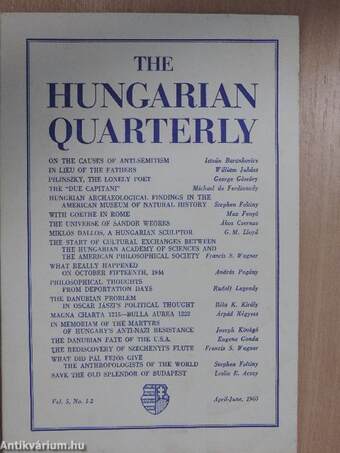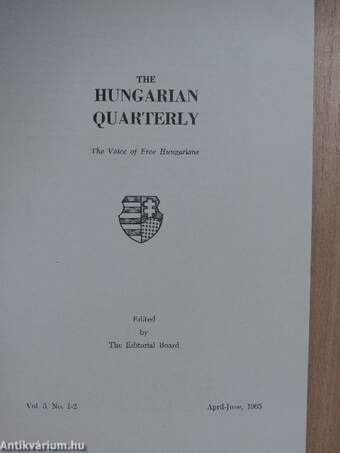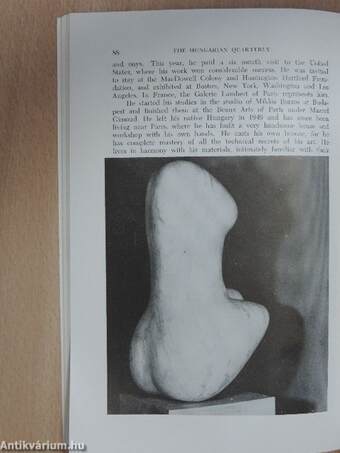1.067.053
kiadvánnyal nyújtjuk Magyarország legnagyobb antikvár könyv-kínálatát

VISSZA
A TETEJÉRE
JAVASLATOKÉszre-
vételek
The Hungarian Quarterly April-June, 1965
The Voice of Free Hungarians - Vol. 5 - No. 1-2
| Kiadó: | |
|---|---|
| Kiadás helye: | |
| Kiadás éve: | |
| Kötés típusa: | Fűzött papírkötés |
| Oldalszám: | 180 oldal |
| Sorozatcím: | The Hungarian Quarterly |
| Kötetszám: | 1-2 |
| Nyelv: | Angol |
| Méret: | 23 cm x 15 cm |
| ISBN: | |
| Megjegyzés: | Fekete-fehér fotókkal, illusztrációkkal. További szerzők a kötetben. |
naponta értesítjük a beérkező friss
kiadványokról
naponta értesítjük a beérkező friss
kiadványokról
Előszó
ON THE CAUSES OF ANTI-SEMITISM1
BY
ISTVAN BARANKOVICS
'"THE toughest question of the entire problem of anti-Semitism is
the discovery of its deeper causes and a consequent satisfactory... Tovább
Előszó
ON THE CAUSES OF ANTI-SEMITISM1
BY
ISTVAN BARANKOVICS
'"THE toughest question of the entire problem of anti-Semitism is
the discovery of its deeper causes and a consequent satisfactory
explanation of anti-Semitism as a whole. Brilliant inquirers, includ-
ing Freud, have arrived at the conclusion that though several
causes may be found for the persecution of the Jews through the
centuries, no one has so far succeeded in giving a wholly satisfying
explanation. Different thinkers, philosophers, theologians, psycholo-
gists and historians have identified the general and principal cause
of anti-Semitism in more or less different phenomena. They have,
of course, given various main reasons for the local, concrete man-
ifestations of anti-Semitism in histoiy. These circumstances explain
the burgeoning of psychological, economic, sociological and other
theories on the causes of anti-Semitism: they range from xenophobia
all the way down to Christophobia. The truth is, however, that
whatever main reason may be given in general or in a particular
circumstance for anti-Semitism, it is always and everywhere the
outcome of a complicated web of causes. Anti-Semitism is every-
where and at all times a highly complex phenomenon whose pre-
vention and cure can only come about in every single instance
through circumspect and manifold counteraction.
-k k k
A remarkable theory seeks to explain the causes of anti-
Semitism on the basis of the relationship between majorities and
minorities.
In the light of the majority-minority theory, the root cause of
anti-Semitism would appear to be the status of the Jews as an
ethnic and/or religious minority in all the national states in which
the dominant majority is looking for the unity, peace and progress
of society in the direction of a religious or national homogenization.
In other words, in all the national states which reject the idea of a Vissza
Tartalom
CONTENTS
On the Causes of Anti-Semitism
István Barankővics 5
In Lieu of the Fathers
W'illiam Juhász 27
Pilinszky, the Lonely Poet
George Gömöri 43
The "Due Capitani"
Michael de Ferdinandy 48
Hungarian Archaeological Findings in the
American Museum of Natural History
Stephen Foltiny 57
With Goethe in Rome
Max Fenyő 69
The Universe of Sándor Weöres
Ákos Csernus 82
Miklós Dallos, a Hungarian Sculptor
G. M. Lloyd 85
The Start of Cultural Exchange Between
the Hungarian Academy of Sciences and
the American Philosophical Society
Francis S. Wagner 90
What Really Happened on October Fifteenth, 1944
at the First Corps Headquarters in Budapest
Dr. András Pogány 98
Philosophical Thoughts from Deportation Days
Rudolf Legendy 113
The Danubian Problem in Oscar Jaszi's Political Thought
Béla K. Király 120
Magna Charta 1215—Bulla Aurea 1222
Árpád Négyessy 135
In Memóriám of the Martyrs
of Hungary's Anti-Nazi Resistance
József Kővágó 145
The Danubian Fate of the U.S.A.
Eugene Gonda 147
The Rediscovery of Szechenyi's Flute
Francis S. Wagner 169
What Did Pal Fejos Give
Anthropologists of the World?
Stephen Foltiny 172
Save the Old Splendor of Budapest
Leslie E. Acsay 177
CONTRIBUTORS TO THIS ISSUE
Barankovics, Istvan—Christian Democratic politician and publicist; leader
of the Democratic People's Party, the largest Hungarian Christian
Democratic Party, 1945-49. Former Editor-in-Chief of MAGYAR NEM-
ZET, the leading democratic Hungarian daily until the Nazi occupation
of Hungary in 1944.
Megvásárolható példányok
Nincs megvásárolható példány
A könyv összes megrendelhető példánya elfogyott. Ha kívánja, előjegyezheti a könyvet, és amint a könyv egy újabb példánya elérhető lesz, értesítjük.







